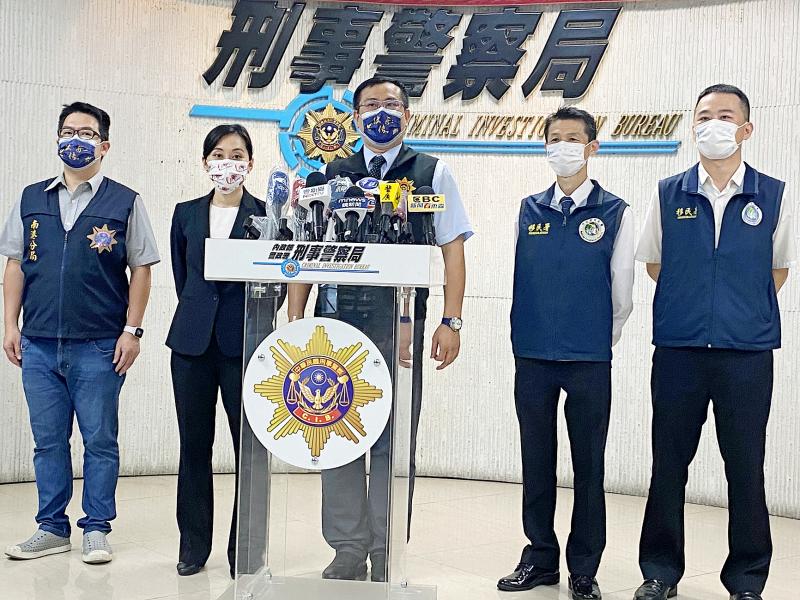The suspect in a US$3 million kidnapping and burglary case in San Francisco was deported to the US on Friday after being apprehended in Kaohsiung, the Criminal Investigation Bureau said yesterday.
Zhang Tianze (張天澤), 30, has been implicated in the March 16 burglary of a woman in San Francisco.
A man broke into the victim’s home and physically restrained her, demanding that she transfer him money while brandishing a knife and threatening to torture her, the San Francisco Police Department said.

Photo: CNA
The victim transferred nearly US$3 million to the man, who left after also taking her mobile phones, the department said.
Investigators identified Zhang as a suspect and determined that he fled the US shortly after the burglary.
Bureau officers identified a man surnamed Zhang who arrived in Taiwan on March 18, first residing in a hotel in Taipei’s Xinyi District (信義) before befriending a female graduate student online.
Zhang allegedly told the student he worked as a cryptocurrency trading adviser in the US and taught her about investing, the bureau said, adding that the two traveled around Taiwan together, allegedly spending more than NT$500,000 in two-and-a-half months.
When police apprehended Zhang in a rental unit in Kaohsiung, the student was also there, but denied knowing that Zhang was wanted in the US, it said.
Police also found five “cold wallets” on Zhang, the bureau said, referring to a storage method for cryptocurrencies.
Police said Zhang traded cryptocurrency for cash on exchanges to fund his travels across Taiwan with the student, adding that they also found about NT$230,000 in cash when he was detained.

MORE VISITORS: The Tourism Administration said that it is seeing positive prospects in its efforts to expand the tourism market in North America and Europe Taiwan has been ranked as the cheapest place in the world to travel to this year, based on a list recommended by NerdWallet. The San Francisco-based personal finance company said that Taiwan topped the list of 16 nations it chose for budget travelers because US tourists do not need visas and travelers can easily have a good meal for less than US$10. A bus ride in Taipei costs just under US$0.50, while subway rides start at US$0.60, the firm said, adding that public transportation in Taiwan is easy to navigate. The firm also called Taiwan a “food lover’s paradise,” citing inexpensive breakfast stalls

TRADE: A mandatory declaration of origin for manufactured goods bound for the US is to take effect on May 7 to block China from exploiting Taiwan’s trade channels All products manufactured in Taiwan and exported to the US must include a signed declaration of origin starting on May 7, the Bureau of Foreign Trade announced yesterday. US President Donald Trump on April 2 imposed a 32 percent tariff on imports from Taiwan, but one week later announced a 90-day pause on its implementation. However, a universal 10 percent tariff was immediately applied to most imports from around the world. On April 12, the Trump administration further exempted computers, smartphones and semiconductors from the new tariffs. In response, President William Lai’s (賴清德) administration has introduced a series of countermeasures to support affected

CROSS-STRAIT: The vast majority of Taiwanese support maintaining the ‘status quo,’ while concern is rising about Beijing’s influence operations More than eight out of 10 Taiwanese reject Beijing’s “one country, two systems” framework for cross-strait relations, according to a survey released by the Mainland Affairs Council (MAC) on Thursday. The MAC’s latest quarterly survey found that 84.4 percent of respondents opposed Beijing’s “one country, two systems” formula for handling cross-strait relations — a figure consistent with past polling. Over the past three years, opposition to the framework has remained high, ranging from a low of 83.6 percent in April 2023 to a peak of 89.6 percent in April last year. In the most recent poll, 82.5 percent also rejected China’s

PLUGGING HOLES: The amendments would bring the legislation in line with systems found in other countries such as Japan and the US, Legislator Chen Kuan-ting said Democratic Progressive Party (DPP) Legislator Chen Kuan-ting (陳冠廷) has proposed amending national security legislation amid a spate of espionage cases. Potential gaps in security vetting procedures for personnel with access to sensitive information prompted him to propose the amendments, which would introduce changes to Article 14 of the Classified National Security Information Protection Act (國家機密保護法), Chen said yesterday. The proposal, which aims to enhance interagency vetting procedures and reduce the risk of classified information leaks, would establish a comprehensive security clearance system in Taiwan, he said. The amendment would require character and loyalty checks for civil servants and intelligence personnel prior to